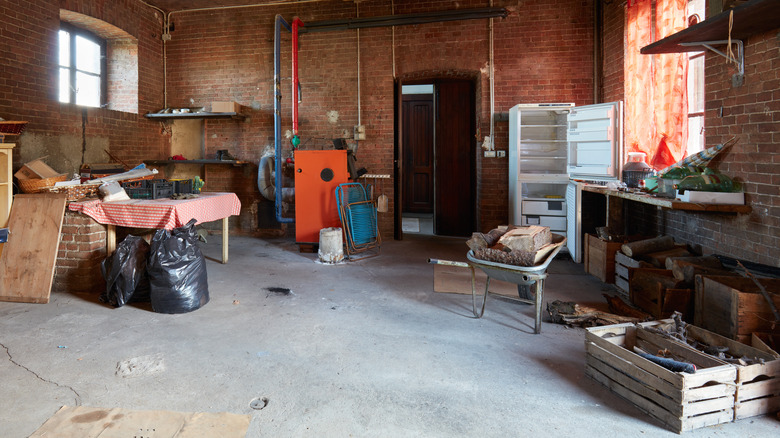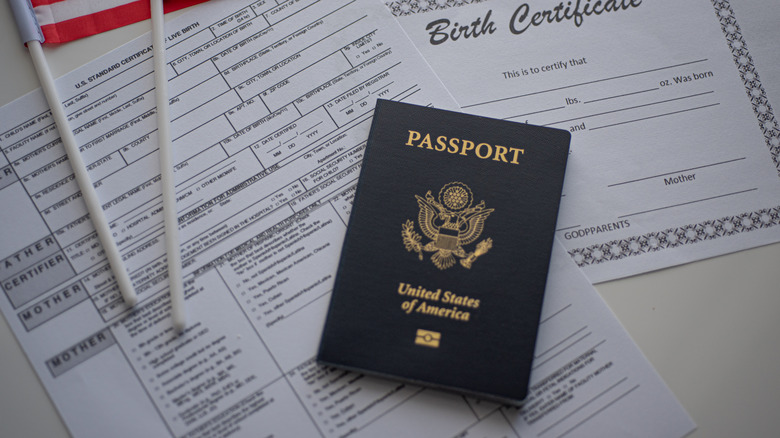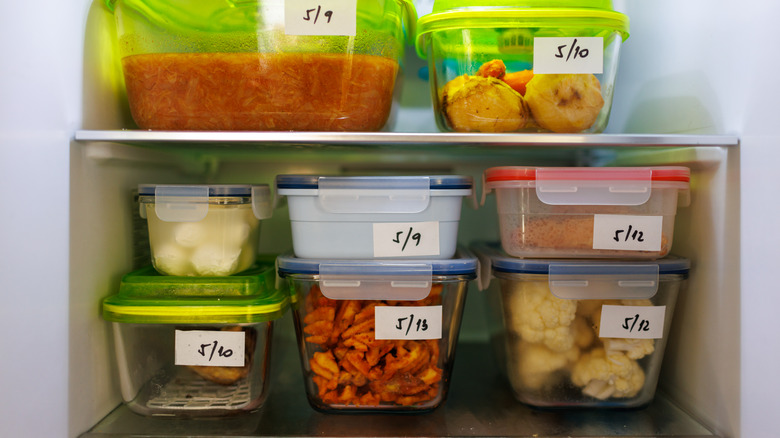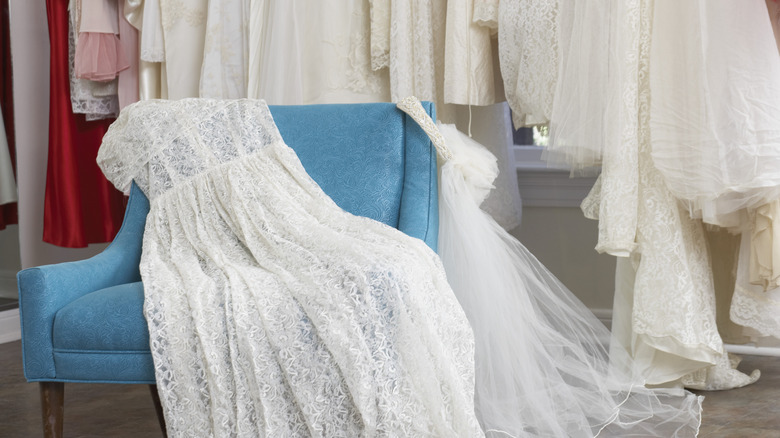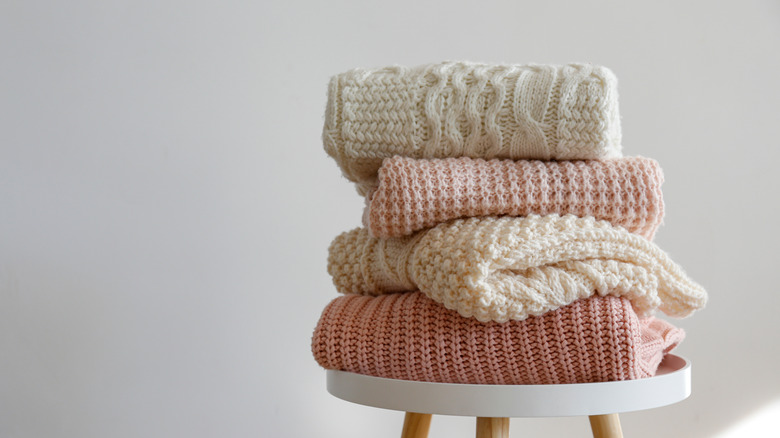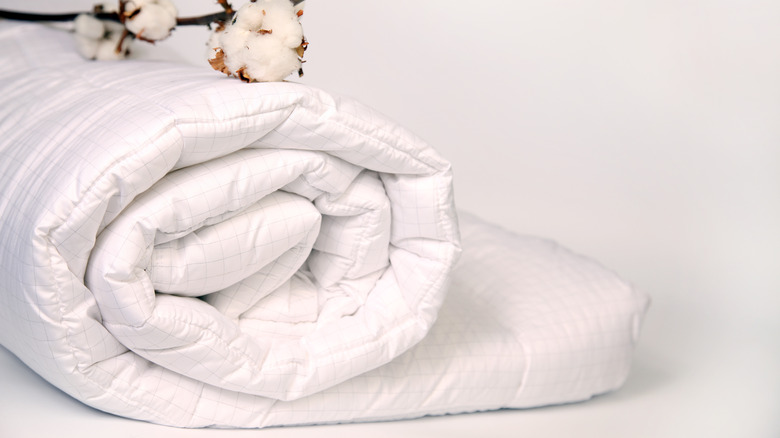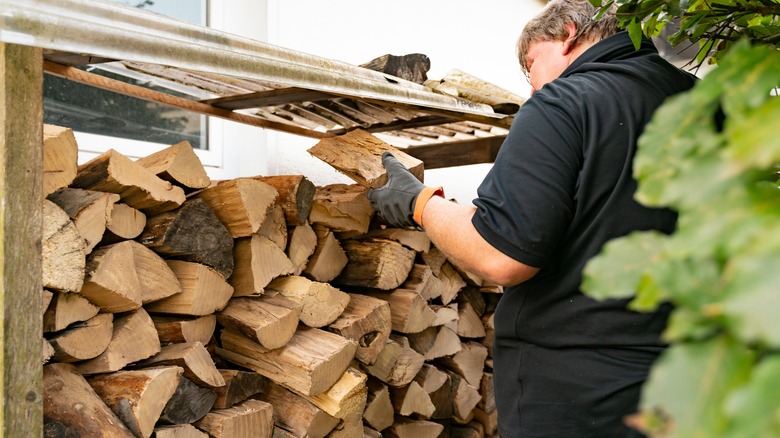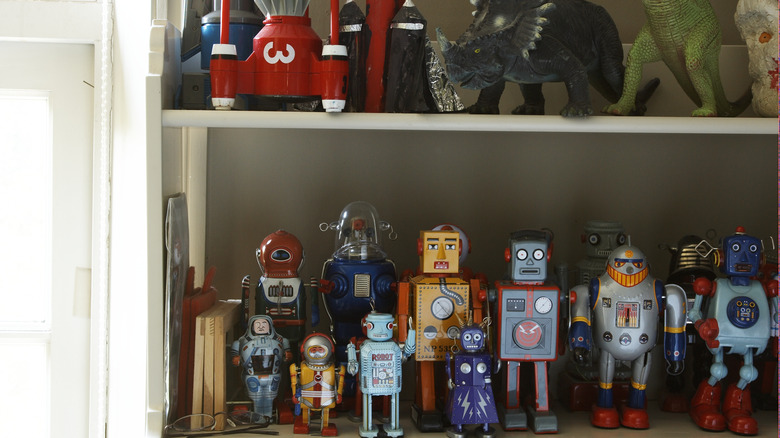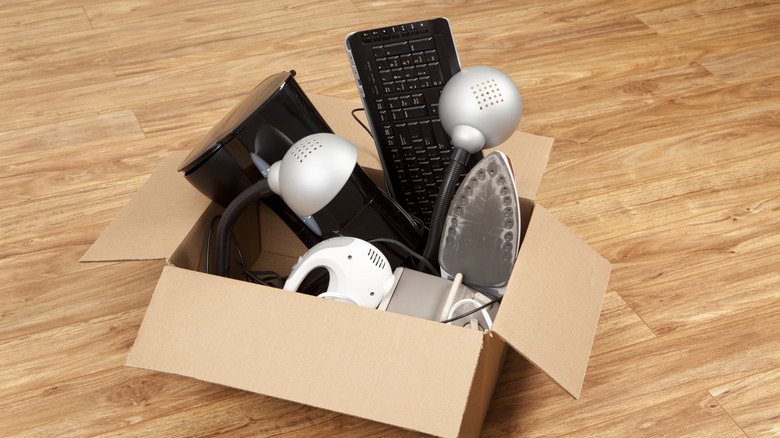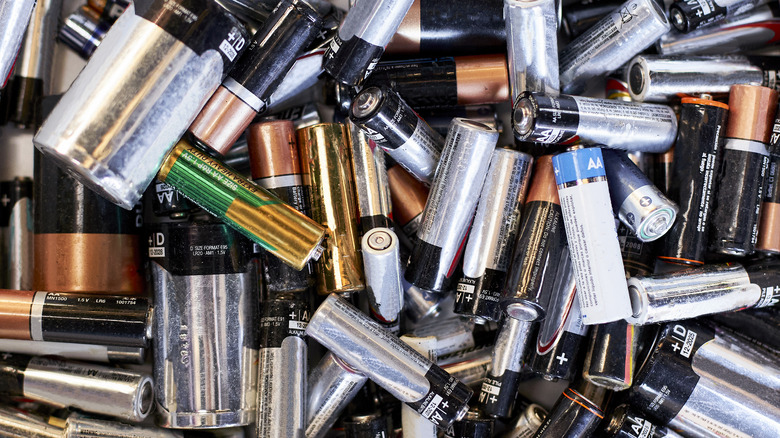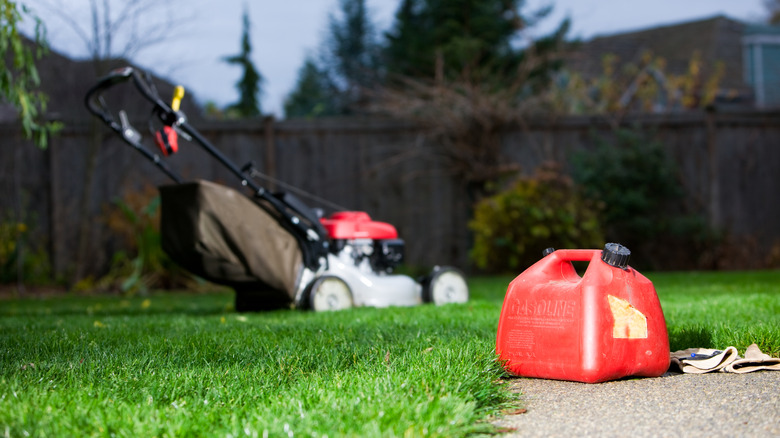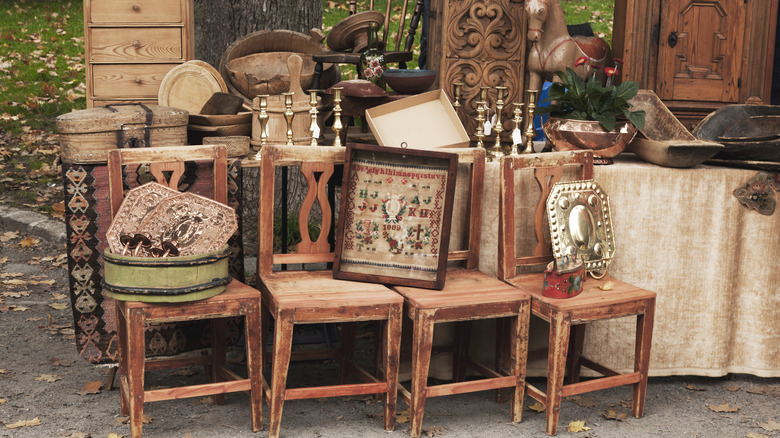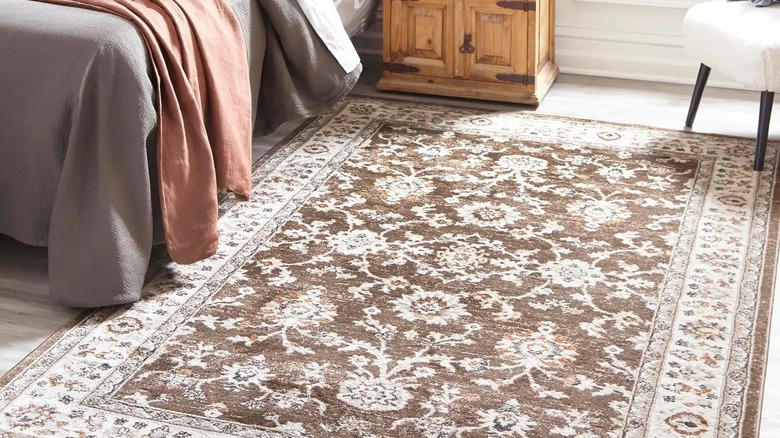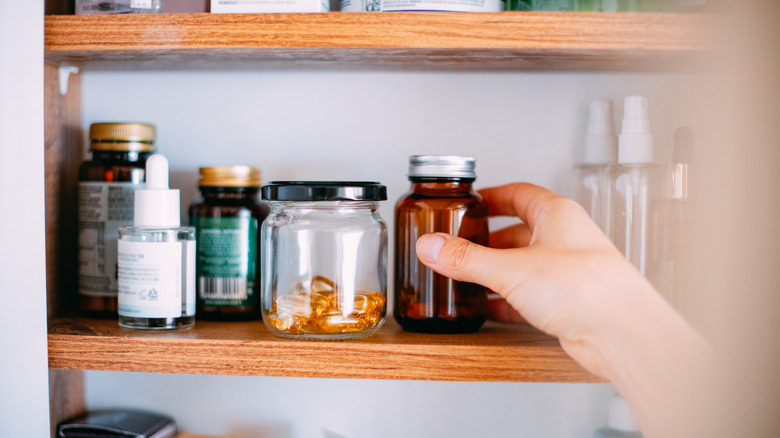The 18 Home Items You Should Avoid Storing In The Basement
Many people seek out a basement when looking for a home because of the extra space it provides. That extra square footage is often invaluable, whether a basement is finished and converted into more living space or simply used as storage. However, most basements aren't the ideal catch-all storage option that homeowners want them to be. About 60% of homes in the United States have moisture problems, which can lead to humidity and mold growth. Because of this, some items, especially those susceptible to moisture, like paper, fabric, and wood, shouldn't be stored in the basement.
The fluctuation in temperature and moisture can put stored items at risk, especially if they're stored for long periods of time. Basements are also at risk of flooding more than other areas of the house, which could be from heavy rain or plumbing issues. You can try the best ways to protect your basement from flooding, but any unexpected excess water can damage items stored there, which may make you reconsider what you keep down there. While some options like airtight storage exist, it's better to be safe than sorry. Even with proper ventilation and insulation, basements still aren't the best choice for these 18 items. They're best kept in closets, pantries, or other rooms in the main part of the house to ensure they're safe.
Important documents
Excess moisture in a basement can cause paper to warp and turn yellow over time. The ink can run and become illegible. Plus, paper is susceptible to mold and mildew growth. This is why you shouldn't keep important documents in your basement. Birth certificates, social security cards, passports, or any paperwork can get damaged even when stored in plastic containers. Rather than storing them in the basement, it's best to manage and organize all of your important documents in a fireproof safe somewhere on a home's upper floor.
Food that could perish
Kitchens can quickly become overstuffed and unorganized. However, you want to avoid keeping perishable food in a basement. These foods, such as meat or dairy products, must be refrigerated or frozen to prevent spoilage or decay. Keeping these in a basement without proper refrigeration will make the food go bad and attract pests like bugs and rodents. Avoid storing food with paper or plastic packaging, as well as most wines. Canned goods and containers with sealed lids can be stored in the basement, however.
Pet supplies
Pet food, just like human food, should also avoid basement storage. If you buy pet food in bulk, it's tempting to keep the excess bags down in the basement to save room before they're opened. However, pet food can attract pests the same way perishable human food can. It's better to keep these in a kitchen, pantry, or mudroom where you're less likely to get pests. You should also avoid storing kitty litter in the basement since the basement moisture can cause it to clump. These are best stored where temperatures are more controlled, like a pantry or mudroom.
Delicate fabrics
Fabric can also be susceptible to damage from moisture as well as mold and mildew growth, especially if not stored properly. Any delicate or sentimental fabric items shouldn't be in the basement. A wedding dress, veil, or baby clothes should avoid the basement if you're trying to preserve them. Delicate animal-based fabrics like fur coats, leather, and suede shouldn't be kept down there to prevent deterioration. Beyond moisture, clothing moths, carpet beetles, and silverfish can cause damage and holes in clothes. Instead, keep them in sealed, airtight bins in a closet or under a bed.
Off-season clothes
Storing winter sweaters in the summer and summer clothes down in the basement during the winter seems obvious. Unfortunately, the basement isn't the best place for these items. Silverfish and firebrats often eat cotton, rayon, and linen, which are common summer fabrics. The larvae of carpet beetles consume wool and mohair, from which many sweaters are made. Instead, it's best to put them in airtight bins or bags and keep them in the back of a closet or under the bed.
Bedding or pillows
Clothing isn't the only fabric that shouldn't be stored in the basement. Mold and mildew from excess moisture are still the reason, though. Comforters, duvets, and pillows that aren't currently being used can take in moisture, getting mildewy and retaining a musty smell. Whether these are off-season bedding or extra ones for the guest room, you want to avoid keeping them down in the basement. It's also recommended to keep sleeping bags and towels out of the basement. These items are best kept in a linen closet, the bedroom closet, or in a storage bench.
Firewood
If you need firewood, it's best not to keep the excess down in the basement. Moisture can lead to wood rot, and rotted or wet pieces produce less heat than dry wood. And if the wood is moist enough to get moldy, you'll also want to avoid burning it not to release potentially harmful particles into the air. Instead, keep firewood outside, off the ground, and at least five feet from the house. Use a firewood rack only for enough wood for two days in the house.
Mementos, keepsakes, or photographs
Don't allow the moisture in a basement to ruin your most special items. Paper mementos like photos, scrapbooks, letters, or cards can all be warped or ruined by moisture or water. Similarly, any mementos, heirlooms, or keepsakes like high school t-shirts, flags, medals, or jewelry can rust, discolor, or be otherwise ruined in a basement. Photos, letters, and cards are best kept in scrapbooks or photo boxes in the main part of the home. Display medals, flags, and other heirlooms in a shadow box. Jewelry should be kept in an airtight jewelry box or safe.
Toys and stuffed animals
When kids outgrow their toys, many people stick them in the basement for storage. However, moisture and temperature changes can damage different kinds of toys. Because of the fabric, stuffed animals can mildew and smell musty, as can toys made of wood. Rust can take over metal toys and render them unusable. Instead of keeping them in the basement, consider donating the ones kids outgrow. If you want to keep a few sentimental, use a toy chest or closet in the central part of the home or a temperature-controlled storage unit if you want them out of the house.
Electronics
It's no secret that water and electronics don't mix, so it's best not to keep these items in the basement. Moisture can corrode the metal parts of the electronics, rendering them useless after some time in the basement. Your old DVD player, television, computer, or video game console should avoid the basement if you want to use them again. It's best to store them in a console table or closet. If it's not an electronic you're planning to use in the future or one you've replaced, take it to an electronics recycling center.
Batteries
When not stored correctly, batteries can erode or rust. Water can also lead to the battery losing its charge. When left for a long time, the pressure in alkaline batteries can build up and cause the battery acid to leak. Temperature fluctuations and moisture changes can destroy a battery, so keeping them out of the basement is best. Instead, keep them in a dry place at room temperature to keep them in the best condition. The best storage locations are a drawer in the kitchen away from the oven or refrigerator, a mudroom, or a spare closet.
Flammable items or hazardous chemicals
This may seem like a given. However, you also may not realize that everyday household items can be flammable or hazardous. Paint, primers, propane, and cleaning supplies are often kept in storage but can become an issue, particularly if they're near a heating source. Keep these items away from furnaces, water heaters, and dryers that can lead to these items catching fire. Combustible liquids and gases, like fuel for a lawn mower, can explode at high temperatures. These items are best kept in well-ventilated areas, an outdoor shed, or a garage.
Furniture or antiques
The humidity in a basement can wreak havoc on furniture. Wood is porous, so moisture can get into the material and cause warping and cracking. Metal furniture can rust. And soft fabrics can get mildewy and smell musty. You definitely don't want to store antique or vintage pieces in a basement where they can potentially be irreversibly damaged. Extra furniture can't be stored in the main part of a home as easily as smaller items. If there's no place in the house, consider putting it in a climate-controlled storage unit or selling the piece.
Rugs and carpets
Replaced an area rug in your living room? Trying a new style in the bedroom? Whatever the reason, don't store the old rug in the basement. Like other soft surfaces, rugs are susceptible to mold and mildew growth in a humid or moist basement. It can also create a warm environment that's inviting to rodents and pests, like carpet beetles. Instead, you should tightly roll up the rug and place it in plastic to protect it from moisture and pests. Store it in the back of a closet or simply sell it if you won't use it again.
Artwork
Moisture is the culprit again for the potential damage to artwork. High humidity can warp a canvas used in oil or acrylic painting. Any artwork on paper is also subject to warping, discoloration, or the colors running. You want to take precautions with any artwork to ensure its preservation. Artwork is best displayed in your home. If you must store it, wrap the artwork in acid-free paper or place foam board on top before storing it in a cardboard box. Then, keep it in a climate-controlled space like a closet or storage locker.
Books
It's already been said how moisture in a basement can affect paper, and that extends to books as well. Avid readers may gain an extensive collection of books, but a basement is no place for your overflow library. The moisture in a basement can warp the pages and spine, cause discoloration, and even make your books moldy. Books can also attract silverfish, which can feed on the starch in the spines. Instead, it's best to store them on bookshelves in the upper part of your home or consider savvy tips for storing your books without using a bookshelf.
Candles
If you've bought a few more candles than you can display in your home, a basement may not be the best place to keep them. If your basement gets hot, the wax can melt; however, cold basements can cause cracking. Heat from a water heater or furnace can also cause candle wax to melt. This can lead to an unexpected mess when retrieving your candles. And if a candle is in glass, it can also be affected by extreme temperature fluctuations. Instead, store them in a temperature-stable environment like an upstairs closet.
Vitamins, supplements, or medication
Temperature and moisture can affect the potency of many vitamins, supplements, and medications. So, if you buy your vitamins and supplements in bulk or have a few months' worth of your medication, avoid storing it in the basement. Temperature fluctuations and humidity can make these less effective. Some can also attract pests that can wriggle their way into the bottles. Store these in a cool, dry place like a pantry shelf, dresser drawer in the bedroom, or a kitchen cabinet that isn't near the fridge, stove, or sink.
